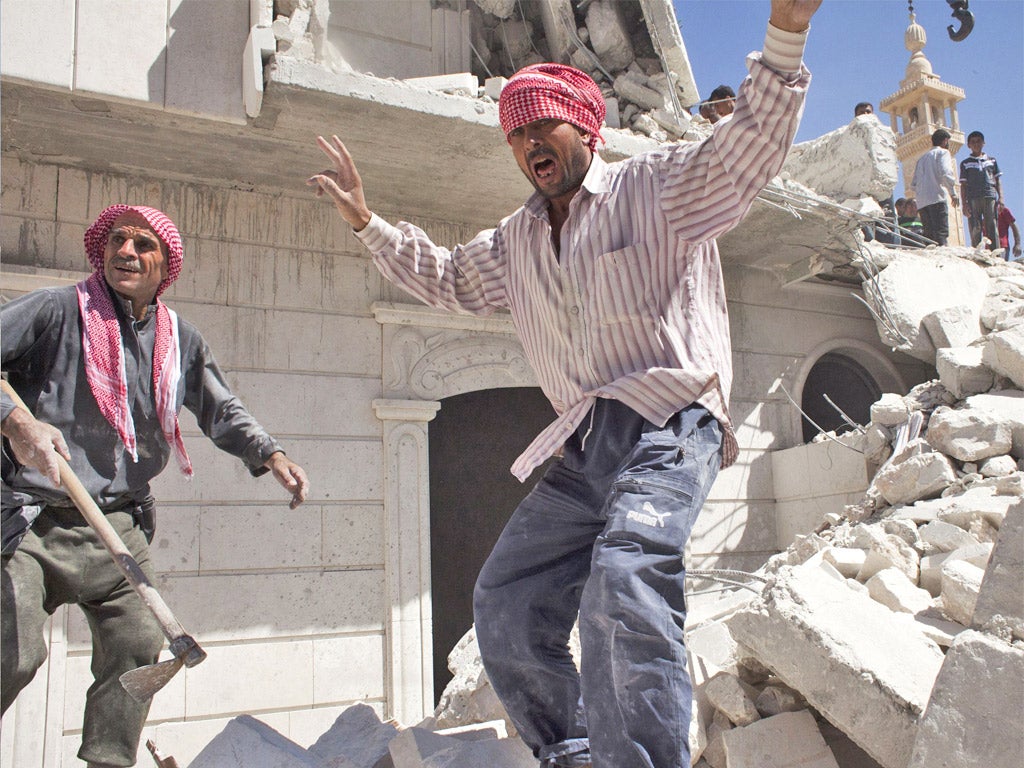'Now we know we will get no help from the West'
The town of al-Bab is paying for its resistance, with 32 dead in the latest strike. Kim Sengupta speaks to survivors who have lost all hope of deliverance

Ahmed al-Sa'eed had been queuing for bread when the air strikes and shelling began. The dozens of people who had been waiting patiently in line for more than two hours dispersed, frantically running home through streets being hit by rocket fire to make sure their families were alright.
The house where Ahmed lived in the Syrian town of al-Bab with his family received direct hits from Bashar al-Assad's warplanes on Monday, the latest in a series of punitive and lethal assaults from air and ground. The front half collapsed into the street, flames shot out from the back. He joined neighbours frantically digging with anything at hand through the dust to try and find those buried under the rubble.
It was a futile attempt to save lives: the bodies of Adel and Amal, brothers of Ahmed and Marwa, a sister, were found three hours later along with that of a friend who had come to visit. Another house, three doors along, was also badly damaged, killing two others. Around the corner another building had collapsed leaving three more dead, including a boy aged three and a six-year-old girl.
Thirty six people were thought to have died, although the figure was later reduced to 32. I knew eight of those who were killed, including Ahmed's family, having met them during my stay in the town last month.
Of these eight, only one, Yahya Mohammed Nassar, was a rebel fighter. Another, Ibrahim al-Hamdo, an activist, had taken part in protests but had never held a gun.
There were no obvious military targets in any of the areas bombarded at the start of this week. Al-Bab is paying a hard price for its defiance; fighters from there formed the largest contingent to take part in the defence of Aleppo and the residents had withstood regular attacks from a military base on the outskirts before chasing out the soldiers.
Around 250 people have been killed since the start of the uprising and quarter of its population of 200,000 are refugees, either in outlying villages or across the border in Turkey.
Ahmed, a 36-year-old office worker, has to now look after the children of his sibling as well as his own and his elderly parents. They would be safer, he felt, outside the town. "It will be my responsibility if anything happened to them, so it is better if they go away for the time being," he said.
"We are all very sad about what has happened: my father and mother are in a state of shock. We did not think this would happen, not after the army camp went. We felt we were safe. Do you remember how happy everyone was?"
Last month the regime troops fled in the early hours of the morning after days of attacks by the rebels. A few were captured; most fled towards Aleppo. That morning the celebrating residents streamed into the encampment, a former agricultural college, chanting slogans of the revolution. Two tanks which had been "liberated" were driven through the town, careering across the roads.
In the afternoon, I accompanied opposition activists who had gone into the camp to bring out dead and injured soldiers abandoned by regime forces when they left. A jet, a Czech-made L-39 Albatross, repeatedly strafed the base and later fired into a residential neighbourhood. An 11-year-old boy, Abed al-Rahman, lost a leg in a missile strike. It was one of the first indications that the regime was preparing to use air strikes with impunity in civilian areas.
The following weeks saw a slight respite in attacks with the regime trying to cope with rebel assaults in Aleppo. Now, with an impasse in the fighting in the city, outlying areas are once again getting hammered, with al-Bab getting special attention.
On the day that al-Bab was getting bombed and the regime carried out other attacks across the country, the French Foreign Minister, Laurent Fabius, threatened a "massive and lightning-fast" response from the West if the Assad regime used chemical weapons. Similar noises have been made Barack Obama and David Cameron.
To the people of al-Bab such posturing just draws hollow laughter. Omar Abdullah al-Hani, whose 73-year-old father Abdullah was injured in the attack, said: "So they will let Bashar kill children, old people, as long as he does not use chemical weapons. What are they afraid of, chemical gasses getting to Europe and America? We know we are not going to get any help from West; we are alone, we don't need their empty words."
Join our commenting forum
Join thought-provoking conversations, follow other Independent readers and see their replies
Comments
Bookmark popover
Removed from bookmarks